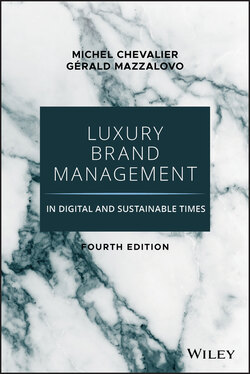Читать книгу Luxury Brand Management in Digital and Sustainable Times - Michel Chevalier - Страница 21
Social and Individual Aspects
ОглавлениеFor psychologists and sociologists focused on the perceptions of luxury, the interest is first on the paradoxical commitment to some object, apparently useless: What are the hidden reasons behind luxury consumption?
The perceptual approach reveals two types of motivations that do not overlap entirely: one can consume luxury (possibly unconsciously) in order to display it or, in a more personal approach, simply to have fun for his own pleasure. This dimension seems often neglected by the sociological discourse but cannot be reduced to the previous one. This is a more private dimension, a dimension of comfort and individual hedonism, as points out, for example, Jean-Paul Sartre in L'Être et le Néant (1943), when he wrote: “the luxury does not designate a quality of the object owned, but a quality of possession.”
It is conceivable, for example, that I buy a luxury soap “because I'm worth it” to identify with the celebrity who makes the claim—in short, for the sake of social representation. But I also buy it because it smells good and its foam is smoother than soap from other brands. These qualities I do not need to show to anyone in order to enjoy them. The soap serves my own hedonism: it pleases me, and if I am no longer convinced that it smells better than the others, I will probably stop buying it, despite the prestige of its brand.
Still, the pleasure born from the consumption of luxury comes also from stories that can be told. Luxury makes us dream and we also can dream alone. How do I know whether my soap feels objectively better or if it is the brand advertising, the reference to a celebrity that convinced me? In this sense, social representation is never far from personal experience. This is what Jean Baudrillard stresses when writing “the private and the social are mutually exclusive only in the daily imagination.”12
Without denying this analysis, one wonders if there is not, among sociologists of luxury, a certain moralist bias that encourages them to ignore the question of hedonism. In their discipline, social experience often overwhelms pure pleasure—or, said differently, the intrinsic qualities of the product. These qualities remain, consumers will agree, constitutive of experience.
